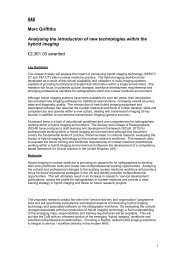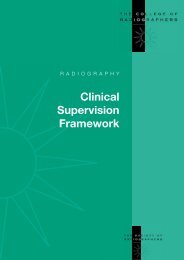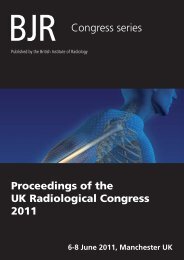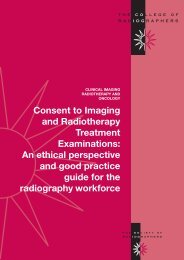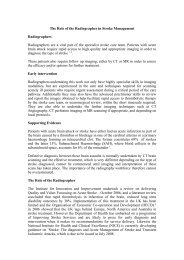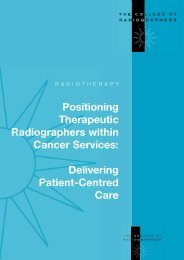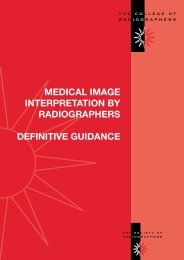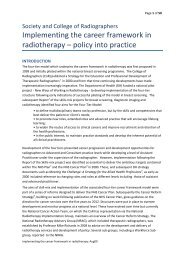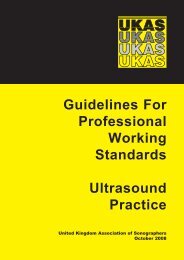SoR Brochure Child and Law SGG-82330 NEW - Society of ...
SoR Brochure Child and Law SGG-82330 NEW - Society of ...
SoR Brochure Child and Law SGG-82330 NEW - Society of ...
Create successful ePaper yourself
Turn your PDF publications into a flip-book with our unique Google optimized e-Paper software.
4.19 Radiographers may be concerned about disclosing any information gained by themabout a child during a diagnostic imaging/radiotherapy treatment. They are not alone;nursing research carried out in Northern Irel<strong>and</strong> in 2003/04 found that healthpr<strong>of</strong>essionals are failing to report suspicious physical child abuse due to the fear <strong>of</strong>litigation, misdiagnosis <strong>and</strong> a lack <strong>of</strong> knowledge about the procedures <strong>of</strong> reporting 41 .These anxieties should be dealt with through thorough, appropriate <strong>and</strong> timely education<strong>and</strong> training, as well as pr<strong>of</strong>essional support.4.20 Consent to disclosure should normally be sought from a competent child <strong>and</strong>parent/carer, unless so doing would place that child, or indeed a sibling, at greater risk.4.21 The radiographer should disclose information about a non-competent child if s/he feelsthat failure to do so may place the child at risk <strong>of</strong> death or serious harm or where theinformation would help to prevent, detect or prosecute a serious crime.4.22 The radiographer should always record when, what <strong>and</strong> why information has beenshared <strong>and</strong> with whom, in order that they are able to justify their decision at a later date.4.23 In the event <strong>of</strong> a suspected NAI, a skeletal survey may be requested by a paediatrician.The parent/carer or competent child would need to know the reasons behind therequest. A paediatrician or a paediatric radiologist should be the person explaining therequest <strong>and</strong> seeking consent. Thus, it is not the role <strong>of</strong> the radiographer to seek initialconsent for the examination, but the radiographer should always reaffirm consent oncontact with the child <strong>and</strong> parent/carer.4.24 In the event <strong>of</strong> a parent/carer or competent child subsequently refusing consent to theexamination once in the clinical imaging department, the radiographer will need to liaisewith the requesting physician. If further discussion with the persons holding parentalresponsibility does not lead to consent then it is likely that the local authority wouldultimately make an application for a court order under the <strong>Child</strong>ren Act 1989 for theprocedure to be carried out in the best interests <strong>of</strong> the child.14





